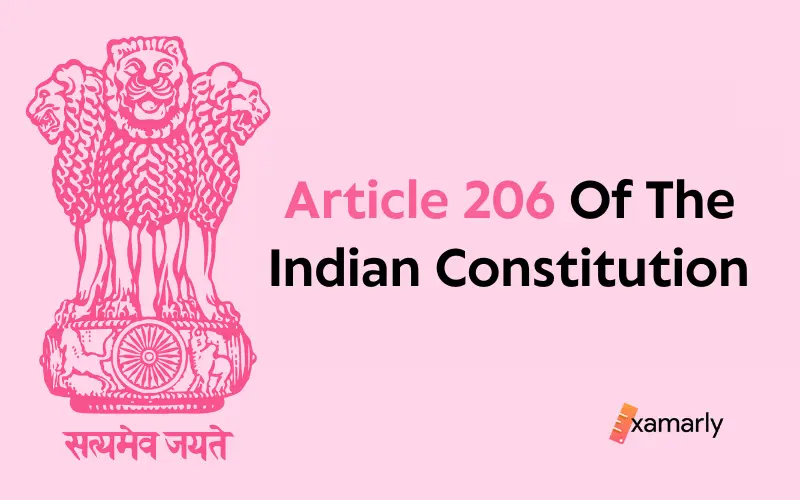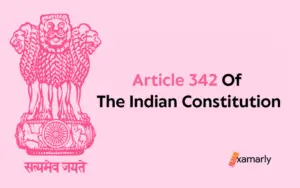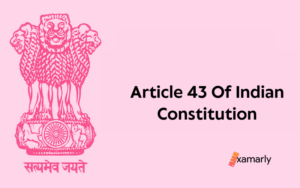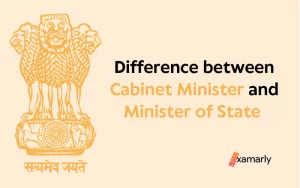Article 206 of the Indian Constitution allows the Legislative Assembly of a state to make grants in advance for a part of any financial year, make a grant for meeting an unexpected demand upon the resources of the state, or make an exceptional grant that forms no part of the current service of any financial year.
These provisions allow the State Government to meet urgent and unforeseen expenditures, without having to wait for the full budget to be passed.
The provisions of Articles 203 and 204, which deal with the voting and passing of grants, also apply to the making of any grant under Article 206.
- Background of Article 206 Of The Indian Constitution
- All About Article 206 of the Indian Constitution
- Conclusion
- Which part of the Constitution does Article 206 belong to?
- What is meant by "Votes On Account"?
- What is meant by "Votes Of Credit"?
- What is an Exceptional Grant?
- Is the Exceptional Grant part of the current budget?
- When are votes on account, votes of credit, and exceptional grants used?
- What is the Consolidated Fund of the State?
Background of Article 206 Of The Indian Constitution
As we dig deeper into Article 206 of the Indian Constitution, let’s first learn about its background and when it was adopted.
Draft Article 181 (Article 206) was debated on 10th June 1949 which laid down the procedure for making a demand for extra funds requiring a vote of the Legislative Assembly.
Earlier, Article 181 of the Draft Consitution (1948) stated:
If in any financial year expenditure from the revenues of the State has been incurred on any service for which the vote of the Legislative Assembly is necessary in excess of the amount granted for that service and for that year, a demand for the excess shall be presented to the Assembly and the provisions of articles 178 and 179 of this Constitution shall have effect in relation to such demand as they have effect in relation to a demand for a grant.
The Chairman of the Drafting Committee proposed an amendment to entirely replace the Draft Article and grant the Legislative Assembly of a State certain powers in regard to votes on account, votes on credit, and exceptional grants, as well as the power to withdraw money for these grants from the Consolidated Fund of the State.
The amendment was taken up without any debate and was adopted on the same day, i.e., 10th June 1949.
All About Article 206 of the Indian Constitution
Clause 1 – As it is & Explained
(1) Notwithstanding anything in the foregoing provisions of this Chapter, the Legislative Assembly of a State shall have power—
(a) to make any grant in advance in respect of the estimated expenditure for a part of any financial year pending the completion of the procedure prescribed in article 203 for the voting of such grant and the passing of the law in accordance with the provisions of article 204 in relation to that expenditure;
(b) to make a grant for meeting an unexpected demand upon the resources of the State when on account of the magnitude or the indefinite character of the service the demand cannot be stated with the details ordinarily given in an annual financial statement;
(c) to make an exceptional grant which forms no part of the current service of any financial year;
and the Legislature of the State shall have power to authorise by law the withdrawal of moneys from the Consolidated Fund of the State for the purposes for which the said grants are made.
The first clause of Article 206 of the Indian Constitution gives the Legislative Assembly of a State the power to make grants in three situations:
1. Allow the State to take an advance amount for a part of any financial year even before the completion of the procedure of demands for grants, or the voting of the said grants as prescribed in Article 203, and the passing of the Appropriation Bills in accordance with the provisions of Article 204 in relation to that expenditure.
This means that the State Government can make a grant in advance for a part of the financial year before the full budget has been passed. This is called “Votes on Account” and is done when the government needs to meet urgent expenditures before the budget is passed.
2. Allow credit money to the State for expenditure on resources required to meet a purpose or service whose expenses cannot be predicted beforehand. The details of these estimates cannot be mentioned in the budget.
This means that the government can make a grant to meet an unexpected demand that cannot be postponed until the next budget, and which cannot be stated in the usual details given in the Annual Financial Statement presented earlier.
3. Allow the State to extra funds as an exceptional grant which is to be used in case a sudden and unanticipated demand arises.
This means that the government can make a grant for a special cause and is not considered a part of the current budget.
These grants are charged upon the Consolidated Fund of the State and the Legislative Assembly of the state holds the power to authorize by law the withdrawal of this money. The State Government must use funds from the Consolidated Fund to pay for the specified purposes these grants are made for.
Clause 2 – As it is & Explained
(2) The provisions of articles 203 and 204 shall have effect in relation to the making of any grant under clause (1) and to any law to be made under that clause as they have effect in relation to the making of a grant with regard to any expenditure mentioned in the annual financial statement and the law to be made for the authorisation of appropriation of moneys out of the Consolidated Fund of the State to meet such expenditure.
The second clause says that the provisions of Articles 203 and 204 relating to the process of allocation of funds for a specific purpose apply when a grant is being made under clause (1) of Article 206.
These provisions have the same effect as they do when a grant is being made for any expenditure mentioned in the Annual Financial Statement, and when a law is being made to authorize the appropriation of funds from the Consolidated Fund of the State in order to cover this expenditure.
Related Articles –
- Article 202 Of The Indian Constitution
- Article 203 Of The Indian Constitution
- Article 204 Of The Indian Constitution
- Article 205 Of The Indian Constitution
Conclusion
Article 206 of the Indian Constitution allows the Legislative Assembly of a State to make certain grants in advance, credit or exceptional grants, which are not part of the current service of any financial year, in certain circumstances. These grants may be made in order to cover estimated expenditures for a part of a financial year or to meet unexpected demands on the state’s resources.
The Legislative Assembly is also empowered to authorize the withdrawal of funds from the state’s Consolidated Fund for the purposes of these grants. The provisions of articles 203 and 204, which relate to the voting of grants and the passing of laws authorizing appropriations, apply to the making of grants under Article 206.
FAQs Related to Article 206 of the Indian Constitution
Which part of the Constitution does Article 206 belong to?
Article 206 belongs to Part VI of the Indian Constitution which is called “The States”.
What is meant by “Votes On Account”?
Votes On Account is nothing but the permission for providing an advance amount from the already sanctioned or to be sanctioned amount to a State through the provisions of Articles 202 and 203 of the Indian Constitution.
What is meant by “Votes Of Credit”?
“Votes on credit” means permitting the State to take a credit money amount for a service or purpose whose expenditure cannot be predicted beforehand.
What is an Exceptional Grant?
Exceptional grants are made when there is a sudden occurrence of expenditure that could not be anticipated earlier. For eg., A war.
Is the Exceptional Grant part of the current budget?
No, an Exceptional Grant is made for a special purpose and is not a part of the current budget.
When are votes on account, votes of credit, and exceptional grants used?
These provisions are used when the government needs to meet urgent and unforeseen expenditures, without having to wait for the passage of a full budget.
What is the Consolidated Fund of the State?
The Consolidated Fund of the State is a Central Government account that holds all the government’s revenue and grants and is used to pay for the government’s expenses. Appropriations from the Consolidated Fund are authorized by law and are typically made in the annual budget process.






